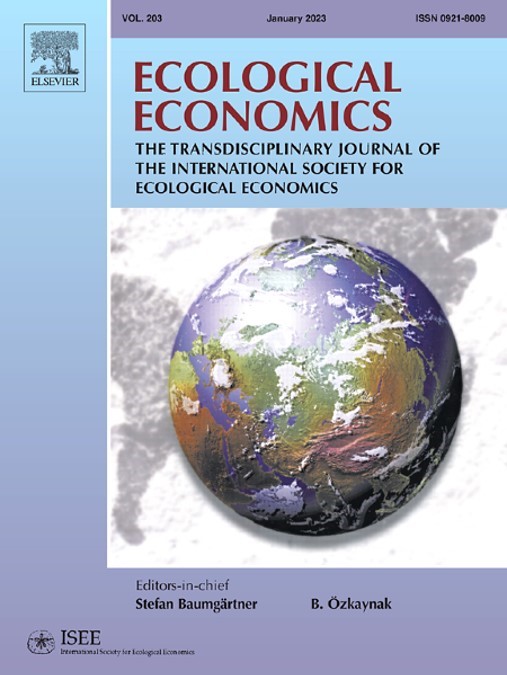
Ecological Economics
The transdisciplinary journal of the International Society for Ecological Economics (ISEE)
ISSN 0921-8009 (print), 873-6106 (online)
Editors-in-Chief: Stefan Baumgärtner and Begüm Özkaynak
Ecological Economics invites contributions for a special issue on Special Issue on Climate Impacts and Adaptation Finance.
Guest edited by Irene Monasterolo (EDHEC, EDHEC-Risk Climate), Nepomuk Dunz (World Bank), Arthur Hrast Essenfelder (European Commission Joint Research Center), Veruska Muccione (University of Zurich and University of Geneva).
Topic:
Growing unmitigated climate change (IPCC 2021), as well as persisting conditions of high public debt, high inflation, and low fiscal space limit investments in resilience and create adaptation gaps, which make countries ill prepared to increasing climate risks (Schipper et al. 2022). Against this background, the traditional adaptation finance response that relies on fiscal space and insurance (Kousky 2019) may not be available or affordable, thus calling for a new financial architecture and instruments to invest in adaptation.
In order to understand the need for adaptation finance, i.e. how much money is needed and for which intervention at the regional and country level, we need a proper assessment of the macro-economic and financial implications of climate impacts. Here main challenges persist. First, the representation of climate-related risks is limited due to their often complex nature (Simpson et al. 2021) – e.g. compounding climate-related risks within themselves (Zscheischler et al. 2018, Kruczkiewicz et al. 2022), and with other risk types such as pandemics (Dunz et al. 2021, Phillips et al. 2020, Ranger et al. 2022). Second, indirect and spillover impacts, and the analysis of how transmission channels of climate-related impacts affect value chains and the financial sector is still at an early stage.
These gaps limit our understanding of climate fiscal and financial risks for sovereigns, and of the adequate fiscal and financial response.
This special issue aims to address these gaps welcoming innovative empirical and modelling contributions that shed light on:
- Strengthening the representation of climate impacts in the economy and financial sector, considering scenarios of tail climate risk, complex and cascading risks, and the interplay between acute and chronic risks.
- Climate impacts’ indirect and spillover effects in the economy and financial sector, considering transmission channels and potential amplification effects.
- Adaptation finance needs and instruments including the role of public and private finance.
- The effectiveness (i.e. risk reduction potential), feasibility (i.e., the potential for implementation), and distributional impacts (i.e. within society and between private and public actors) of adaptation finance response under different global warming scenario, also considering the interplay and trade-offs between mitigation and climate adaptation.
Timeline:
The special issue is open for submission starting from June 1, 2023. The deadline for submissions is March 1, 2024. Submissions that are selected for the review process will be invited for presentation and discussion in a special-issue-related event in June 2024.
Submissions must be made through the journal’s online submission platform Editorial Manager.
Preparing Contributions:
Contributions to the special issue should be Analysis as described in the Guide for Authors.
When submitting your contribution, select “VSI: Climate impacts and adaptation finance” as the article type. All contributions to a special issue must be prepared according to the journal’s Guide for Authors.
Review Process:
All contributions will go through the normal peer-review process and are expected to at least meet, if not exceed, the usual quality standards of articles published in Ecological Economics. This includes the possibility that a given contribution will not be published if it is found to be not suitable.
Publication Format:
Special issues are published as virtual special issues. Each paper is published as soon as the proof is corrected in the next available regular issue, with an imprint indicating that it is part of a special issue. Simultaneously all special-issue articles are gathered together in an online-only grouping for the special issue itself. On ScienceDirect, the special issue is set up under the heading Article Collections and filled with special-issue-articles one by one, as they are published. The special issue becomes visible to end-users once the first article is linked to the special issue, rather than waiting for all papers to be finalised before it can be compiled.
Contact:
For questions, contact the lead guest editor, Irene Monasterolo, irene.monasterolo@gmail.com.
References:
Dunz, N., Mazzocchetti, A., Monasterolo, I., Essenfelder, A., Raberto, M. (2021). Compounding COVID-19 and climate risks: the interplay of banks’ lending and government’s policy in the shock recovery. Journal of Banking and Finance, 106303.
IPCC. (2021). Summary for Policymakers. In: Climate Change 2021: The Physical Science Basis. Contribution of Working Group I to the Sixth Assessment Report of the Intergovernmental Panel on Climate Change. Cambridge University Press. In Press.
Kousky, C. (2019). The Role of Natural Disaster Insurance in Recovery and Risk Reduction. Annual Review of Resource Economics, 11(1), 399–418. https://doi.org/10.1146/annurev-resource-100518-094028
Kruczkiewicz, A. et al. (2022). Multiform flood risk in a rapidly changing world: what we do not do, what we should and why it matters. Environmental Research Letters, 17, 8, 1-9.
Phillips, C. A., Caldas, A., Cleetus, R., Dahl, K. A., Declet-Barreto, J., Licker, R., Merner, L. D., Ortiz-Partida, J. P., Phelan, A. L., Spanger-Siegfried, E., Talati, S., Trisos, C. H., & Carlson, C. J. (2020). Compound climate risks in the COVID-19 pandemic. Nature Climate Change, 10, 586–588. https://doi.org/10.1038/s41558-020-0804-2
Ranger, N., Mahul, O., Monasterolo, I. (2022). Assessing Financial Risks from Physical Climate Shock: A Framework for Scenario Generation. The World Bank, Equitable Growth, Finance & Institutions Insight. Washington, DC: World Bank. https://openknowledge.worldbank.org/handle/10986/37041
Schipper, E.L.F., A. Revi, B.L. Preston, E.R. Carr, S.H. Eriksen, L.R. Fernandez-Carril, B.C. Glavovic, N.J.M. Hilmi, D. Ley, R. Mukerji, M.S. Muylaert de Araujo, R. Perez, S.K. Rose, and P.K. Singh, 2022: Climate Resilient Development Pathways. In: Climate Change 2022: Impacts, Adaptation and Vulnerability. Contribution of Working Group II to the Sixth Assessment Report of the Intergovernmental Panel on Climate Change [H.-O. Pörtner, D.C. Roberts, M. Tignor, E.S. Poloczanska, K. Mintenbeck, A. Alegría, M. Craig, S. Langsdorf, S. Löschke, V. Möller, A. Okem, B. Rama (eds.)]. Cambridge University Press, Cambridge, UK and New York, NY, USA, pp. 2655–2807, doi:10.1017/9781009325844.027.
Simpson, N. P., Mach, K. J., Constable, A., Hess, J., Hogarth, R., Howden, M., … & Trisos, C. H. (2021). A framework for complex climate change risk assessment. One Earth, 4(4), 489-501.
Zscheischler, J., Westra, S., van den Hurk, B. J. J. M., Seneviratne, S. I., Ward, P. J., Pitman, A., Aghakouchak, A., Bresch, D. N., Leonard, M., Wahl, T., Zhang, X. (2018). Future climate risk from compound events. Nature Climate Change, 8(6), 469–477. https://doi.org/10.1038/s41558-018-0156-3.


